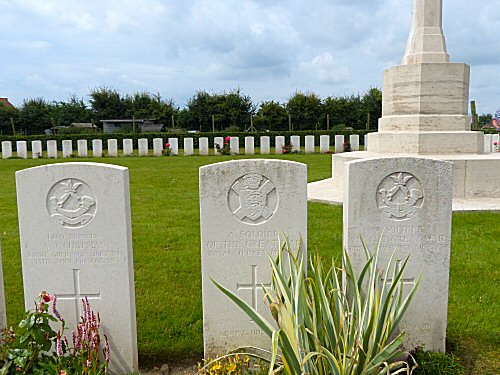|
Throughout the majority of the Commonwealth War Grave
Commission's Cemeteries, and especially so in those that
can readily be found in France and Flanders, there is
an appreciable proportion of graves of men and women whereby
the name of the individual is not known. In many of these
cases, they are simply categorised as 'A Soldier of
the Great War'. There is no categorisation to say
that they were British or Canadian for example, that they
served with a particular regiment, and so forth. In the
words of the inscription, originally provided by Rudyard
Kipling, they are 'Known Unto God'.
However, in the post-Great War period, there was considerable
effort expended in identifying the names of men whose
bodies had been exhumed and were to be reburied in a nearby
Cemetery established by the CWGC's forerunner. Identification
would rely upon papers found with the body, identity disks,
and the uniform from the helmet or cap down to the boots.
An Australian could be identified as such since he wore
a different jacket from a British soldier. Cap-badges,
shoulder titles, medal ribbons, badges of rank and other
accoutrements would also help. But, for all that effort,
men remained unidentified. Yet, as an expedient, a man
might be described by the CWGC as 'A Sergeant of the
Hampshire Regiment' for example, where full identification
was not possible.
|

Outtersteene Cemetery
An Unknown Jerseyman - Centre
(II.H.59)
An Unknown Guernseyman - Right (II.H.60)
If you are visiting a cemetery
and you spot an Unknown Islander, do please advise
the Group of the cemetery and grave details, via
the "Contact Us" facility on the menu
bar.
|
In this photograph (provided by Ian Ronayne), the
grave (II.H.58) on the left is that of 1409 Private
Arthur J Chapman of the RGLI while the Unknown Guernseyman
on the right is also from that Regiment. The headstone
for the Unknown Jerseyman in the centre bears the
cap-badge of the Royal Militia Island of Jersey.
However, given that Jersey's Militia did not provide
a unit that wore that cap-badge, the soldier is
thought to be one of three men of the Jersey Overseas
Contingent which, at the beginning of 1918, was
assigned to the 2nd Battalion, Hampshire Regiment.
This is based upon the fact that the Contingent
wore the 'Jersey' shoulder titles as opposed to
those of the Hampshires.
During the post-Great War exhumation and reburial
process outlined, a number of Channel Islanders
were also partially identified, although sadly not
sufficiently enough to conclusively provide a name.
Their graves, including the two shown in the photograph
are listed below:
Guernseymen:
| Honnechy Cemetery |
II.A.18 |
II.A.19 |
II.A.24 |
II.A.25 |
II.A.26 |
| |
II.A.40 |
|
|
|
|
| |
| Outtersteene Cemetery |
II.E.32 |
II.H.53 |
II.H.60 |
IV.A.44 |
IV.A.50 |
| |
IV.A.53 |
IV.E.28 |
IV.E.30 |
IV.E.31 |
IV.E.32 |
| |
IV.E.34 |
|
|
|
|
| |
| Trois Arbres |
II.K.11 |
II.K.26 |
II.K.27 |
II.L.2 |
II.L.4 |
| |
II.L.5 |
II.M.26 |
II.M.31 |
II.M.35 |
II.O.24 |
| |
II.O.25 |
II.O.27 |
|
|
|
Jerseymen:
| Bazentin-Le-Petit |
A.3 |
Poelcapelle |
XXII.D.20 |
| |
| Cerisy-Gailly French |
II.A.6 |
Outtersteene Cemetery |
II.H.59 |
|
|